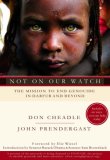Summary | Excerpt | Reviews | Beyond the Book | Readalikes | Genres & Themes | Author Bio

 Book Reviewed by:
Book Reviewed by:
BookBrowse Review Team
Buy This Book
That is our choice.
Overcoming Obstacles to Action
So if it is as easy as that, why don’t we do it? Mostly it is what we call the Four Horsemen Enabling the Apocalypse: apathy, indifference, ignorance, and policy inertia. The U.S. government simply doesn’t want to wade too deeply into the troubled waters of places like northern Uganda and Congo. We did once, in Somalia, and the resulting tragedy of Black Hawk Down—when eighteen American servicemen were killed in the streets of Mogadishu—made everyone nervous about recommitting any effort to African war zones we don’t fully understand.
As we all know by now, during the 1994 genocide in Rwanda, American citizens—to the extent that they even heard about what was happening—largely averted their eyes, and as a result the U.S. government did nothing. Similar averting occurred during the 1975–1979 genocide in Cambodia, from 1992 to 1995 in Bosnia, and even during the Holocaust. As our friend Samantha Power documented in her book on genocide, A Problem from Hell: America and the Age of Genocide, this is the usual response to horrific crimes against humanity—disbelief in the totality of the horror and a genuine hope that the problem will go away.
Somalia’s Black Hawk Down actually provides the wrong lesson. Instead of running away from these crisis zones, we could protect many lives, and do so much good, if we gave a little more of our time, energy, and resources, in ways that understand the local context. In most cases, we don’t have to send 30,000 U.S. Marines every time there is a problem, though working with other countries to apply military force is sometimes necessary. Diplomatic leadership in support of the Three Ps (Protection, Punishment, Peacemaking) is what it takes to make a substantial difference.
Beyond indifference and the ghosts of Somalia, responding to Darfur has an additional obstacle. Sudanese government officials, who were close to Osama bin Laden when he lived in that country from 1991 until 1996, are now cooperating with American counterterrorism authorities. The regime in Khartoum rightly concluded that if they provided nuggets of information about al-Qaeda suspects and detainees to the Americans, the value of this information would outweigh outrage over their state-supported genocide. In other words, when U.S. counterterrorism objectives meet up with anti-genocide objectives, Sudanese officials had a hunch that counterterrorism would win every time. These officials have been right in their calculations so far. As of this writing, near the end of 2006, the United States had done little to seriously confront the Sudanese regime over its policies.
In order to win the peace in Sudan, we must first win an ideological battle at home. We must show that combating crimes against humanity is as important as combating terrorism. Often, as in the case of Sudan, the pursuit of both objectives doesn’t have to be mutually exclusive. History has demonstrated that Sudanese government officials change their behavior when they face genuine international diplomatic and economic pressure. If we worked to build strong international consensus for targeted punishments of these officials to meet both counterterrorism and human rights objectives, they would comply.
The policy battle lines are clear. On the one hand are the forces of the status quo: officials from the United States, other governments, and the UN who are inclined to look the other way when the alarm bell sounds and simply send food and medicine to the victims. They believe that the American public and other citizens around the world do not care enough to create a political cost for their inaction. These officials are allowed to remain bystanders because of complicit citizens who know about what is happening but do not speak out, giving the officials an excuse to do nothing.
Excerpted from NOT ON OUR WATCH by Don Cheadle and John Prendergast. Copyright 2007 Don Cheadle and John Prendergast. All rights reserved. Published by Hyperion. Available wherever books are sold.





The House on Biscayne Bay
by Chanel Cleeton
As death stalks a gothic mansion in Miami, the lives of two women intertwine as the past and present collide.

The Flower Sisters
by Michelle Collins Anderson
From the new Fannie Flagg of the Ozarks, a richly-woven story of family, forgiveness, and reinvention.

The Funeral Cryer by Wenyan Lu
Debut novelist Wenyan Lu brings us this witty yet profound story about one woman's midlife reawakening in contemporary rural China.
Your guide toexceptional books
BookBrowse seeks out and recommends the best in contemporary fiction and nonfiction—books that not only engage and entertain but also deepen our understanding of ourselves and the world around us.